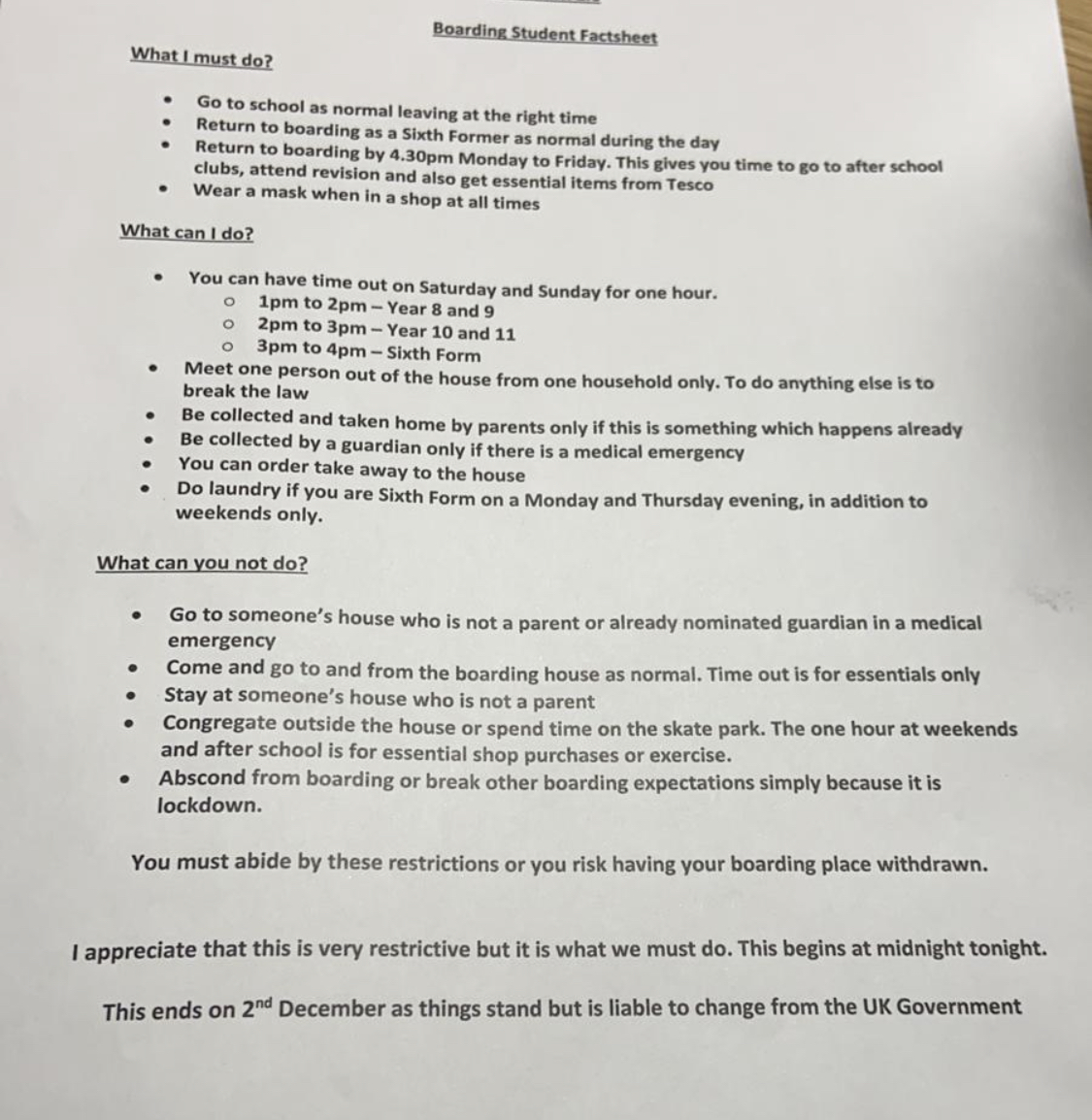I have been sent this by a concerned parent of a sixth former at a boarding school, who was sent it in turn. It is atrocious and would appear to amount to false imprisonment. It is all too typical of schools and universities so I use it to illustrate the gravity of this problem.
This is without prejudice to the contention that the Regulations themselves amount to false arrest. Even if that is right, an institution may be guilty of the offence and tort of false imprisonment if the restrictions they impose go beyond (here, well beyond) the law.
Two initial points.
First, the children are told they 'must' abide by the restrictions.
Secondly, it has been indicated to them that these restrictions are because of the law, when most of the restrictions emphatically are not.
First, the children are told they 'must' abide by the restrictions.
Secondly, it has been indicated to them that these restrictions are because of the law, when most of the restrictions emphatically are not.
In respect of the law, the case of R (Jollah) v Secretary of State, which sets out the current state of the caselaw in respect of false imprisonment, makes clear that a person may be falsely imprisoned where they are required to remain in a dwelling for fixed periods every day,..
...even if that imprisonment is not enforced uniformly and a psn can come and go without being stopped. Given the control on children at schools and the nature of the coercion in this case - threatening the withdrawal of a boarding place - that test would appear to be met here.
Schools are in loco parentis and this does allow them some right to control the whereabouts of children, impose curfews, etc. Yet these restrictions apply to a sixth former and throughout the time at which they are normally free to walk around the town (in weekends),
To the restrictions themselves.
The restrictions for the weekends amount to house arrest. They go way beyond the inclusive (not exclusive) list of reasonable excuses for leaving a place where a person is living.
The restrictions for the weekends amount to house arrest. They go way beyond the inclusive (not exclusive) list of reasonable excuses for leaving a place where a person is living.
These include not merely exercise but 'recreation', which is an extremely broad term. They are unrestricted in time or in place.
Children within the House appear to be recognised as a household. Thus, any of them can meet with any other at any time in any place.
Children within the House appear to be recognised as a household. Thus, any of them can meet with any other at any time in any place.
The restrictions on gatherings impose no limits on the numbers of persons from one household who may gather. As an illustration of this, troopers from the Household Cavalry cleaned a memorial during the last 'lockdown' and the Army stated, rightly,...
...that they were permitted to gather as part of one household.
Failure to state that clearly, in circumstances where strict instructions were given, is unfortunate altho' (not being a restriction on their ability to leave the House)not an additional ground of false imprisonment.
Failure to state that clearly, in circumstances where strict instructions were given, is unfortunate altho' (not being a restriction on their ability to leave the House)not an additional ground of false imprisonment.
It is entirely wrong to restrict the circumstances in which they may return home. A child at boarding school lives both at school and at home and may quite reasonably go from one to the other. Same with university students.
The Regulations impose criminal offences and interfere with fundamental rights, so must be interpreted: (a) in so far as possible, compatibly with the ECHR (including the right to private and family life); and (b) in favour of the person who might otherwise commit an offence.
Likewise, it is an interference with the students' Article 8 rights to prevent a guardian from collecting him or her only in a medical emergency.
It is wrong and dangerous to prevent a student from going to someone's house in a medical emergency. These are specific exceptions (both to restrictions on leaving the house and on gatherings) and the school's restriction puts its charges at risk of harm.
There is no basis for saying that 'time out is for essentials only'. The Regulations allow for exercise and recreation where reasonably necessary, not where it is essential; and must be interpreted (in so far as possible) compatibly with Article 8 rights.
Insofar as it is not a normal school rule not to congregate, this is a further imposition of a restriction that is not made in the Regulations. Any child can congregate with any other member of their household (the boarding house) and may leave at any time for recreation.
In summary, attempts by schools and universities to lock their students in their houses or their rooms are quite probably the imposition on them of false imprisonment insofar as the school or university has means of coercing or enforcing such restrictions.
This is especially the case where they are restricted to leaving the House for limited periods per day or the imposition of curfews (save where they might normally be applied by a school in loco parentis (which a university is not and cannot be).
@threadreaderapp Unroll
@threadreaderapp Unroll

 Read on Twitter
Read on Twitter


